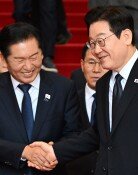Government Continues to Impose Development Charges on Seoul Metropolitan Area
Government Continues to Impose Development Charges on Seoul Metropolitan Area
Posted October. 22, 2003 22:48,
The government announced it will continue to maintain charges on development, which were previously planned for removal starting next year.
However, the government postponed its plan to impose charges on apartment reconstruction, the possible administrative capital sites in Chungcheong Province, and adjacent city of Daejeon, although the matter will be discussed in later meetings.
At the cabinet council meeting on October 22, the cabinet members decided to revise the Act on Charges Management and to continue levying charges on the landowners of Seoul metropolitan area. Charges on development were supposed to be abolished starting from January 1, 2004.
Such a decision came to prevent possible speculative dealings in land as a series of plans to dampen the real estate boom were announced including developing new residential areas and residential lands as well as removing restriction on greenbelts.
Those who own land in Seoul metropolitan area pay 25 percent of development profit as charges on development if they are engaged in 30 projects including development of residential lands, suburban areas, industrial/distribution/tourist complexes, and hot springs or golf courses. Development profit is calculated by subtracting the land price before starting the development, an increase in the land price, and cost of the development from the land price at the end of the development.
Charges on development were first imposed in 1980s to deter real estate speculation and promote efficiency in land usage by collecting a part of the development profit when a land is used for unintended purposes. The policy is one of the three laws reflecting the land-as-public-property concept introduced along with two other laws. The other two limits the size of residential land a household can own and tax profits accrued on idle land as a result of development, regardless of whether the profits were realized by sale or other means.
The government did not collect charges on development in 1998 and 1999 during the financial crisis. However, the tax was imposed again from 2000 although the rate was lowered to 25 percent from the previous 50 percent. As the Act on Charges Management took effect in late 2001, landowners of non-Seoul metropolitan areas were exempted from the tax payment. The tax imposed on Seoul metropolitan area was to be eliminated starting from January 1, 2004. As of late last year, 12,237 out of 15,668 cases, or 1.499 trillion won out of 2.115 trillion won imposed were collected. The charges were used in projects to balance regional development such as providing assistance to less developed areas.
Jae-Seong Hwang jsonhng@donga.com





![[속보]한덕수 1심 징역 23년 선고…“내란 가담자 중벌 불가피”](https://dimg.donga.com/c/138/175/90/1/wps/NEWS/IMAGE/2026/01/21/133201789.1.jpg)

